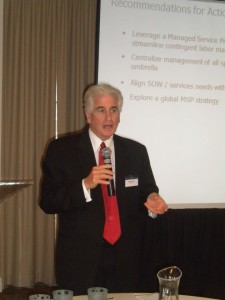by Leland Sandler | Jul 17, 2015 | Executive Advisor, Leland Sandler, The Sandler Group

Leland Sandler speaking at an HR conference in Zurich
An executive advisor plays a key role in establishing powerful and enduring change in businesses and organizations through a unique set of strategies and techniques. An executive advisor creates the conditions for individuals and teams to overcome their own internal barriers to change, to take stock of and transcend their own blind spots, and to see errors and weaknesses as prime opportunities for personal growth. Once the strategy for execution is established, the advisor helps the client instill the process, through practices, tools, techniques, and structure, that leads them to permanently change themselves for the better.
A professional may seek the service of an executive advisor for a number of reasons. Listed below are some of the most common roles an executive advisor takes on throughout his career:
- Expand the ability of leaders and CEOs to deal with the increasing complexity of the world in which they operate in
- Help professionals deal more effectively with a number of possible constituents including board members, direct reports, customers/clients, as well as business development relationships
- Assist first time CEOs in need of a safe sounding board to help guide them and challenge them in areas where they do not yet have experience
- Provide direct, honest feedback to professionals and someone to hold them accountable as they deal with important and challenging issues
- Identify differences and issues between individual team members (work styles, communication, decision making, etc) and make concrete suggestions on how to better optimize execution and meeting their goals.
While it is important for the executive advisor to be experienced and knowledgeable to provide efficient advising service to the client, it is equally important for the client to be a good advising candidate. A good advising candidate is someone who is open to the possibility of personal change, no matter how successful he or she has been in the past. An executive advisor will work best with someone who is willing to stay the course even when they finally confront a key issue about themselves and/or their team.
A good advisor-client relationship is highly confidential and personal. It requires a great deal of trust on the part of both parties. Advising involvement can vary from meeting with a client every couple of weeks to attending key meetings as well as individual advising meetings each week.
The key to being a successful executive advisor is to be able to effectively identify the focal issue or opportunity that the client most wants to go after. The advisor then must spend a fitting amount of time with the client to provide the initial scaffolding and structure necessary to bring about permanent change.
by Leland Sandler | Jul 1, 2015 | Leland Sandler, Military, Military Officers, The Sandler Group, Veterans

Looking to build your leadership team?
Hiring a veteran military officer brings your company a foundation of skills and competencies that you’re unlikely to find almost anywhere else in the private sector. These individuals are disciplined, have an exceptional work ethic and success orientation – characteristics key to the leadership of any business.
I had the incredible opportunity to work with the military through the San Diego Chamber of Commerce Military Advisory Committee. I and other San Diego-area business leaders gladly gave our time to these men and women who are making such a huge difference for our country. In my case, I used my expertise as an executive advisor to provide career development advice to officers who were about to come out of the military. Starting with basic questions such as what was important to them and what they thought they might want to do as a civilian, we determined, based on their skill set (especially leadership skills) what industry and what role might be a good fit. Through the members San Diego Chamber of Commerce we placed these officers into private sector jobs, greatly easing their transition from military to civilian life.
As an executive advisor I immediately saw the leadership skills possessed by military officers. What was interesting is that those skills were not as immediately apparent to many of them, as they often misjudged how readily applicable their military leadership experience was to the private sector. It’s true that one of the challenges some military officers face when they get out into the private sector is their hierarchical orientation. This is a key part of the military’s organizational structure. Yet, in today’s business world, we’re looking for flatter and flatter organizations. We’re looking to drive decision down throughout the organization, to broadly empower. In my advisory sessions with these officers I was able to explore with them key ways private sector leadership differed from military leadership, along with strategies for most effectively channeling their leadership abilities. While just about any career shift involves adjustments and adaptation, the skills and experience veterans obtained in the military form a solid foundation for senior leadership in business.
by Leland Sandler | Jun 24, 2015 | Executive Advisor, Leland Sandler, The Sandler Group
In my career as an executive advisor, I’ve learned a number of things both about myself and about business.
As for myself, I realized early on that I needed to embrace an ongoing process of self-development and self-improvement. This ongoing process is a way in which I could become a better version of myself and, consequently, a better asset to my clients. This process of self-development and self-improvement is what I use with all my clients. Living it myself has made me more effective in helping others embrace and live it.
From a business perspective, the most important thing I’ve learned is how to build authentic relationships. I spend a great deal of time going to different events, meeting different people and discovering who they are, what they’ve learned and what I might be able to learn from them. When I look at building relationships, I don’t think about it from the standpoint of whether I am going to get work from it or not, I’m thinking about it largely in terms of connecting with other individuals. The result, interestingly enough, is that almost every relationship has been of value; whether in a personal way, or helping me build a successful business.
For the past seventeen years, I’ve done the bulk of my work advising life sciences executives and it’s been exceptionally rewarding. I have learned what it is to work with dedicated scientists and engineers building products that affect the lives of millions of people. It is an industry where I’ve also built lasting relationships and learned about the complexities of leading pharmaceutical and medical device companies, lessons that are applicable to other industries as well.
Finally, building any business is challenging. Being an executive advisor has given me a vantage point to understand the challenges a wide range of issues and challenges that executives face in building their businesses. A somewhat unique challenge to my work is getting the business community to see the work of an executive advisor as a need to have rather than a nice to have. In learning how executives change other people’s assumptions, I am learning how to change assumptions about executive advising related to real value. I have learned that my work needs to be focused on metrics and results. All the work I do has specific outcomes that we hold ourselves to. I discuss that with the client on the front end. I measure throughout the process. And I measure at the end. I want to demonstrate that the executive advising makes a fundamental difference in their business.






Follow Me